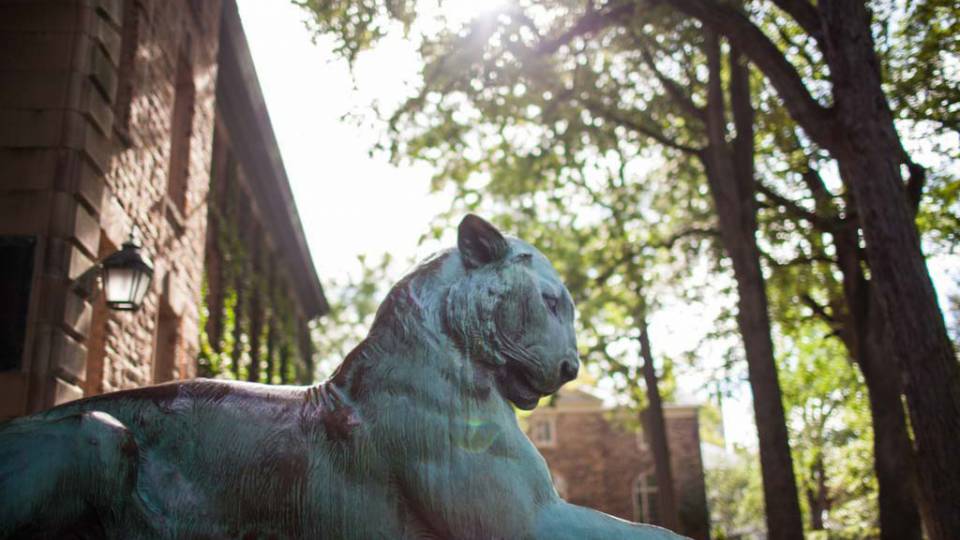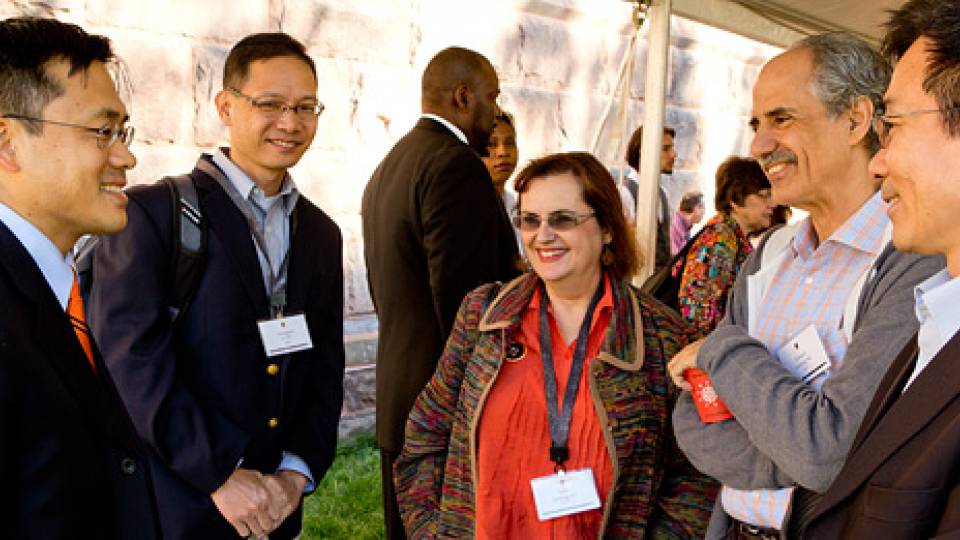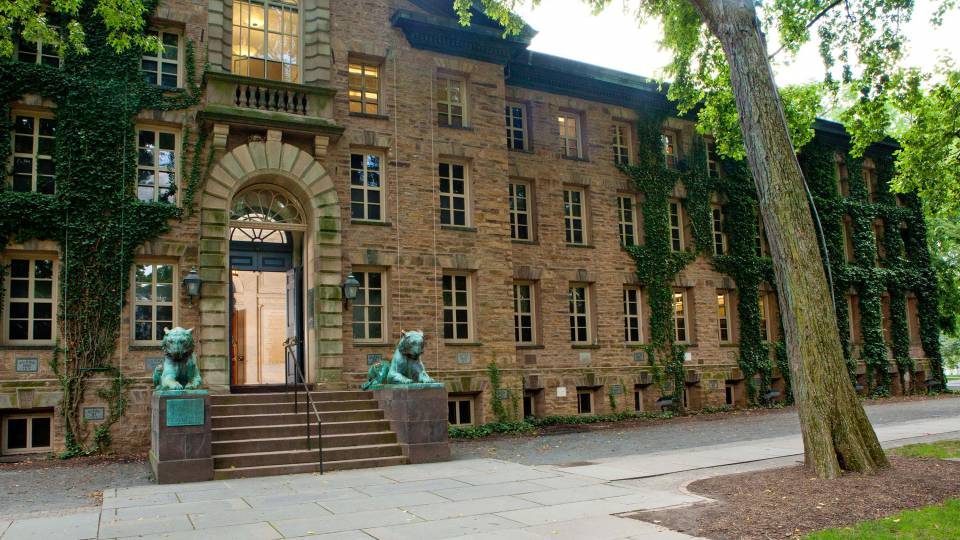William Russel(Link is external), who has served as dean of Princeton University’s Graduate School(Link is external) since 2002, has announced that this will be his final year as dean.
Russel said he has enjoyed “participating in the forward-thinking leadership of senior officers of the University, collaborating with outstanding faculty members, getting to know very bright and creative graduate students, and working with a highly skilled and dedicated staff.”
After a year’s sabbatical, Russel, the Arthur W. Marks ’19 Professor of Chemical Engineering(Link is external), intends to transfer to emeritus status. He has been a member of the Princeton faculty since 1974.
Princeton President Christopher L. Eisgruber(Link is external), who served as provost from 2004 to 2013 and worked closely with Russel over the past decade, noted: “Bill Russel’s leadership has enhanced Princeton’s Graduate School in ways too numerous to count. He has sustained academic excellence, improved our stipend and support system for graduate students, integrated those students more fully into the University community, and strengthened the ties that bind the University to its graduate alumni. Bill Russel has given unselfishly to this University, and his legacy will benefit our graduate students, and Princeton more generally, for many years to come.”
The Graduate School, established in 1900, enrolls about 2,600 students pursuing master’s and doctoral degrees in 42 departments and programs. Russel and his wife, Priscilla, reside in Wyman House, on the Graduate College grounds, where they host graduate students for talks by faculty (High Tables) and informal monthly dinners and welcome back graduate alumni.
Russel noted that he is proud of many improvements spanning academics, recruitment, student life, financial aid and alumni relations, recognizing that “little is accomplished by the dean and Graduate School staff alone without support or initiative from the provost, the president and other offices of the University.”
The changes Russel has overseen include the following:
- Improving the academic curriculum, including the differentiation of the biological sciences with the establishment of Ph.D. programs in quantitative and computational biology(Link is external) and neuroscience(Link is external), and the creation of the Interdisciplinary Doctoral Program in the Humanities(Link is external), initiated through the leadership of then-provost Eisgruber.
- Using modern measures to monitor progress of Ph.D. students through the annual reenrollment process(Link is external) to identify sooner students who are struggling.
- Instituting summer stipends(Link is external) for graduate students in the humanities and social sciences that allow them to pursue their academic work throughout the year.
- Increasing diversity(Link is external) among the graduate student body through the efforts of the Graduate School’s associate dean for academics and diversity, through recruiting, mentoring, creating programming and bringing students to degree completion.
- Steadily expanding professional development programming, created by dedicated staff in the McGraw Center for Teaching and Learning(Link is external), the Princeton Writing Program(Link is external), and Career Services(Link is external), to better prepare graduate students for their careers.
- Making substantial improvements in student life, as judged against a 2002 report of the Graduate Student Government(Link is external). They include creation of the Dissertation Completion Enrollment status to enable Ph.D. students who have not completed their dissertation within the typical five-year period to have access and often support for up to two more years; improvements in parking and transportation, such as a campus shuttle to the Graduate College; and increased support for graduate students with children through programs such as the Childbirth Accommodation and Adoption Policy, Student Child Care Assistance Program, and Carebridge program for assistance with work, personal or family issues.
- Increasing investment in graduate student housing to replace the Butler Apartments and Hibben and Magie apartments with a modern set of apartments on Lake Carnegie(Link is external), to support a commitment to house 70 percent of regularly enrolled graduate students.
- Strengthening the Association of Princeton Graduate Alumni, leading to the creation of graduate alumni staff in the Alumni Association shared with the Graduate School, who have planned the University’s first graduate alumni conference, “Many Minds, Many Stripes: A Princeton University Conference for Graduate Alumni(Link is external),” to be held Oct. 17 to 19.
- Surveying of graduate students and graduate alumni, conducted by the vice provost for institutional research, to assess graduate programs.
- Expanding the Graduate School staff, with essential support from the Office of the Provost, to provide the capacity to support programming more effectively.
At the national level, Russel said he also enjoyed collaborating with other deans around the country through his participation on the executive committees of the Council of Graduate Schools and Association of Graduate Schools.
During his tenure as dean, Russel has continued his research in processing, structure, properties and applications of colloidal dispersions — for example, explaining why paint cracks and gels sometimes collapse.
He is a member of the National Academy of Engineering and American Academy of Arts and Sciences, and a fellow of the American Association for the Advancement of Science. He is also the recipient of the 2007 Award for Surface and Colloid Chemistry from the American Chemical Society; the 1999 Bingham Medal from the Society of Rheology, for outstanding contributions to rheology, the science of deformation and flow of matter; and the 1992 William H. Walker Award for Excellence in Contributions to Chemical Engineering Literature, from the American Institute of Chemical Engineers. He earned his B.A. and M.ChE. degrees from Rice University and his Ph.D. from Stanford University.
Russel’s service to Princeton includes chairing the chemical engineering department — now the Department of Chemical and Biological Engineering — from 1987 to 1996. From 1996 to 1998 he served as director of the Princeton Materials Institute, which was merged into the Princeton Institute for the Science and Technology of Materials(Link is external).
Eisgruber has appointed a search committee composed of members of the faculty and graduate students, which is chaired by Claire Gmachl(Link is external), the Eugene Higgins Professor of Electrical Engineering(Link is external) and vice dean of the School of Engineering and Applied Science(Link is external).
Faculty members serving on the panel are:
Eddie Glaude, the William S. Tod Professor of Religion and African American Studies, and chair of the Center for African American Studies(Link is external); Mikko Haataja, associate professor of mechanical and aerospace engineering(Link is external); Wendy Heller, professor of music(Link is external) and director of the Program in Italian Studies(Link is external); Bo Honore, the Class of 1913 Professor of Political Economy and professor of economics(Link is external); and Sabine Kastner(Link is external), professor of psychology(Link is external) and the Princeton Neuroscience Institute(Link is external).
Audrey Yau, a graduate student in geosciences(Link is external), and Friederike Funk, a graduate student in psychology(Link is external) and president of Graduate Student Goverment(Link is external), are also on the committee.





